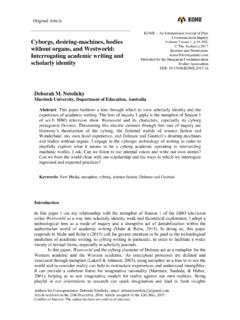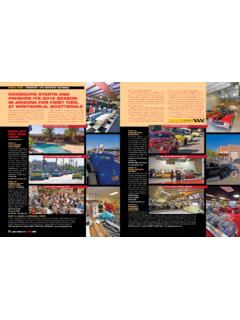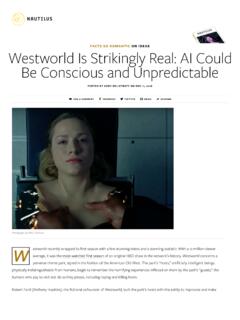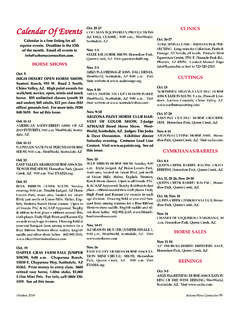Transcription of Westworld: Ideology, Simulation, Spectacle
1 Larry Alan Busk. westworld : ideology , simulation , Spectacle Mediations (Fall 2016) 25-38. : ideology , simulation , SpectacleLarry Alan BuskIt is not only that Hollywood stages a semblance of real life deprived of the weight and inertia of materiality in late capitalist consumerist society, real social life itself somehow acquires the features of a staged fake, with our neighbours behaving in real life like stage actors and extras .. Again, the ultimate truth of the capitalist utilitarian despiritualized universe is the dematerialization of real life itself, its reversal into a spectral show.
2 1A smiling face with a microphone is looking into the camera, addressing the audience. We are watching an advertisement; the product being pitched is a vacation, the vacation of the future today. 2 The spokesman tells us about Delos, a high-tech amusement park and resort that offers the guest an immersion into a meticulously recreated world of the past, with the options of Roman World, Medieval World, and of course westworld . Our pitchman solicits testimonials of guests who have just come from a stay at the park. The first is fresh from westworld : When you play cowboys and Indians as a kid, you d point your fingers and go bang bang and the other kid would lie down and pretend dead.
3 Well, westworld is the same thing only it s for real! The man then tells us, with alarming glee: I shot six people! The pitchman calmly explains that the guest has actually shot six highly sophisticated androids, amenities of the park designed to look, sound, and bleed just like human beings. They may have been robots, the guest confirms, I think they were mean, I know they were robots. For the second testimonial, the best thing about Roman World is the men ; she describes it as a warm, glowing place to be. The third endorsement has come from a stint as the sheriff of westworld .
4 When asked if the experience seemed real, he responds: It s the realest thing I ve ever done. That Michael Crichton s 1973 film westworld begins with an advertisement is oddly appropriate, not only because it evokes Adorno s claim that every product of the 26 Larry Alan Buskculture industry becomes its own advertisement, but also because it immediately establishes the film s central motif: the dialectic of reality and It is likely that the ostensibly authentic testimonials are actually paid actors reciting prepared lines, but we are led to believe (by the advertisement) that these volunteers chosen at random have spontaneously offered their reviews immediately after a spell at the resort.
5 The promotion is certainly compelling, but upon scrutiny it cannot possibly sit right. Did the production crew show up at an airport and wait around for perfectly articulate, satisfied customers to come along at just the right time in the pitch? The game is up, if we are not already hoodwinked, when the spokesman turns, raises his voice, and asks: What do you think, folks, was it worth a thousand dollars a day? and we suddenly see a crowd of enthusiastic people answering in the affirmative. The advertisement for an amusement park that insists so forcefully on its reality and authenticity is itself hopelessly contrived and phony, as all advertisements are, and the only possible way not to notice this is to mistake an obvious fa ade for reality.
6 The advertisement is therefore the perfect introduction to the resort: one counterfeit production trying to sell us another. It is also remarkable that the film begins with what is unambiguously a commercial for the amusement park; no character in the film is watching the advertisement it is addressed to the audience of the film itself. Pointing at the camera, the spokesman tells us that, at Delos, you get the choice of the vacation you want. It is as though the audience of the film is being sold, not the film, but the vacation. We can even imagine that, if only for a brief time, one might fail to realize that the film has actually started perhaps this is only another ad one has to sit through before the movie.
7 The opening credits begin only after this initial year (2016), HBO is returning to westworld and producing a series based on its central concept. It is thus an opportune time for critical theory to rediscover this film as well. Though over forty years old, it illuminates (however inadvertently) many of the problems that confront a critical analysis of capitalist society in the last decades of the twentieth century and the first decades of the twenty-first: the ontological and normative status of reality as opposed to illusion under the ubiquity of the virtual, the limits of ideology critique in the era of simulation , and the implications of increasingly spectacular social relations.
8 Even more interestingly, more contemporary films which more obviously and self-consciously concern these issues (The Matrix, The Truman Show) do not capture the cultural logic in question as forcefully as westworld . In a sense, Crichton s film is a prophetic cultural document evocative of tendencies that were only nascent at the time of its production, something of an omen for political-cultural phenomena that would only later be fully articulated in theory. In what follows, I attempt to trace these phenomena as expressed in 27 WestworldWestworld and correlate them to three related but distinct moments in critical theory: the early notion of false consciousness, Baudrillard s theory of the hyperreal, and Slavoj i ek s insight into spectacular reality.
9 The three worlds that make up the Delos amusement park have been re-created with precision down to the smallest detail. 4 The purpose of the resort is not the vicarious nostalgia that comes with visiting medieval castles or western ghost towns, but the opportunity to exist, temporarily, in a refurnished world. It promises the ability to relive the height of decadent imperial Rome, courtly twelfth century Europe, or the lawless American frontier of the 1880 s. As the guest, you leave your clothes and belongings in a locker to be retrieved upon exiting the resort.
10 You leave your old life behind for a limited period of time and immerse yourself in a synthetic old west or imperial palace (notwithstanding one guest s anachronistic eyeglasses). In westworld , the primary setting of the film, one gets a real gun and holster, a cowboy hat, and spurs. The food, whiskey, and rustic accommodations are all realistic. There are barroom fights, bank robberies, and jailbreaks. There is a colorful cast of predictable old west characters to interact with all uncannily lifelike androids: a crusty hotel bellhop, a maternal hotel proprietress, a terse bartender, a sheriff, and a madam.









